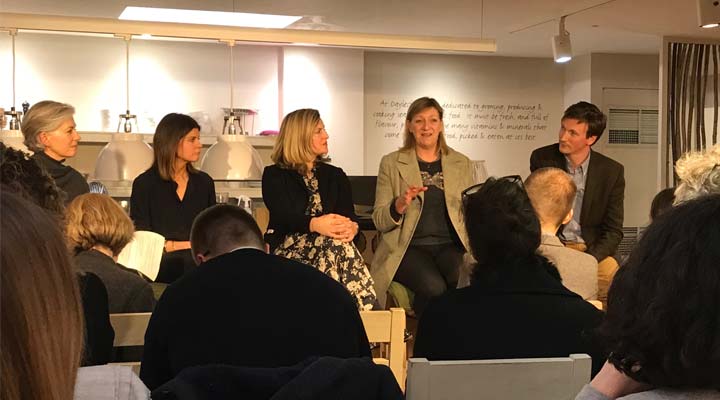Daylesford discusses: less meat, better quality

Daylesford organic farm produces high quality, sustainably produced food, which it sells through its attractive and busy farm shops in Gloucestershire and London.
The panel of speakers included food author and journalist Rose Prince, nutritional health coach Lizzie King, nutritional therapist Eve Kalinik and naturopath and herbalist Rhaya Jordan. Alongside these experts was environmental scientist Tim Field, who is also head of sustainability at Daylesford.
Tim admitted that livestock are contributing to global warming through their green house gas emissions, but when managed the right way, they also help to capture carbon in soils, and this is often overlooked.
“Ruminants have been grazing for millions of years with the associated birds and insects that go alongside them,” said Tim. “If we didn’t have ruminants the land would revert to scrub and blackthorn. Animals are an important part of the landscape – and this is often forgotten in the argument.
“Rearing livestock ensures the cycling of nutrients through their manure and builds fertility in the soil so that plants, crops and pastures can thrive.”
Tim went on to explain how mixed species swards, such as those that the Daylesford herd grazes, are good for bees.
“Herb-rich pastures are a life-line for pollinators,” he said. “Multi-flowering sainfoin and clovers, and hundreds of wildflowers in permanent pastures, offer a wide choice for bees and other insects. The same cannot be said for monocultures of oilseed rape and maize. And feeding maize to cattle is like us eating a vindaloo every day. It is too hot and too much.
“Producing grass-fed meat from slower growing native breeds of cattle and sheep is more expensive, but the meat they give is high quality and much more nutrient dense.”
Generational change
Rose Prince said that the way meat is produced in mainstream farming is making people sick.
“Not feeding ruminants grass makes them sick and then us,” she said. “The way beef is reared in the USA has contributed to the obesity epidemic. If animals are not fed naturally, this changes their muscle structure, which consequently impacts on us.”
Rose mourned the loss of ‘grandmother skills,’ and the knowledge of how to cook an entire animal without wasting a scrap, whilst respecting the animal and the environment in which it lived.
“Back in 2005 I made 16 helpings of food from one 2.5kg, high quality chicken – including roast chicken, cold meat salad, sandwiches, with soup and risotto made from the stock,” said Rose. “We need to get back to this way of thinking when it comes to food, but it is difficult to replace those skills.
“This passing of information is very much a verbal tradition. We can write book after book, but unless you start quite young, you cannot learn this way.”
Changing ways
In the 1980’s most food was still eaten in the home – but now more food is consumed outside the home than in. Home-cooked meals are in the minority and meat has become an ever-present commodity. But it should be valued and treasured.
“Meat is no longer an expensive treat but something that is eaten casually, every day, in the street now,” commented Rhaya Jordan.
Lizzie King agreed saying “There seems to be a strange sense of entitlement now: if you want to eat something, you go out and get it. I think we really need to think about what meat we want to eat and how we eat it.
“Perhaps we need to rethink the plate and treat meat as a special ‘side’ next to the pulses and vegetables.”
Research done at the University of Michigan has shown that the healthiest diets are those that centre on diversity and seasonality, such as those eaten in France.
“We should be eating and drinking everything in moderation and enjoying the cooking and eating of it; reveling in all its deliciousness. There is, after all, nothing better than a slow cooked piece of meat” said Rose.
Listen to the whole debate on the Daylesford Facebook page.
Pasture for Life is a partner of Agricology – a community of farmers and researchers brought together by Daylesford, to share knowledge and work towards a more resource-efficient, resilient and profitable agriculture.



